

Order a call
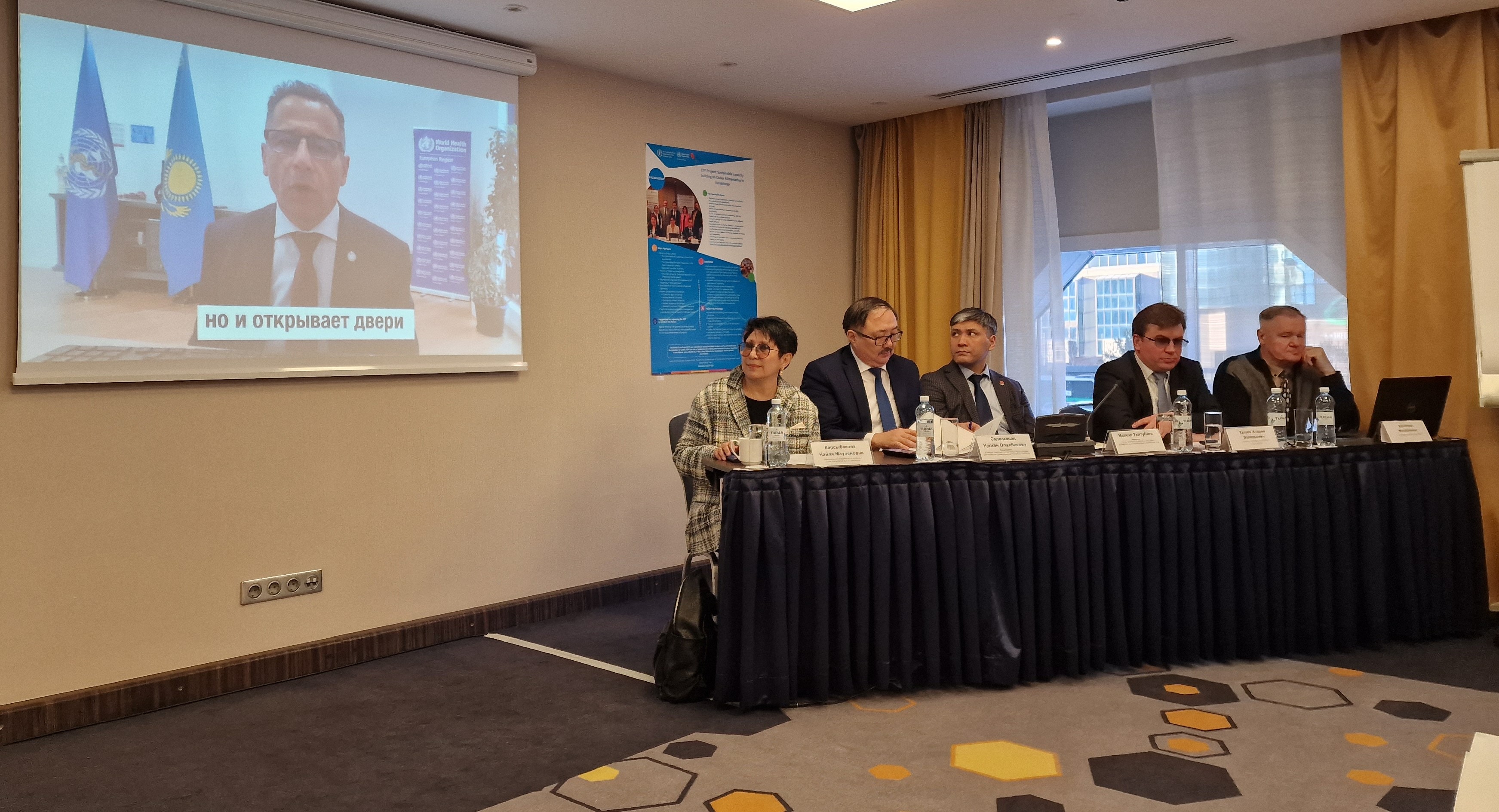
On December 7, 2023, a conference «Codex Alimentarius. Outcomes, lessons learned, successes» was held. This event was timed to complete the WHO Trust Fund Project «Building Sustainable National Capacity on Codex Alimentarius» for 2021-2023 (hereinafter – СTF Project). This conference was opened by the Chairman of the Committee for Sanitary and Epidemiological Control of the Ministry of Health of the Republic of Kazakhstan Sadvakasov N.O. Also, the WHO Representative and Head of WHO Country Office in Kazakhstan Skender Syla, Sub-Regional Representative of the WOAH Sub-Regional Representation for Central Asia Mereke Taitubaev, FAO-Kazakhstan Partnership Program Coordinator Andrey Ershov delivered a welcoming speech. The event was attended by about 40 people from interested public authorities, the National Chamber of Entrepreneurs of the Republic of Kazakhstan «Atameken», research institutes, universities, etc.
National Coordinator Codex Alimentarius Karsybekova N.M. made a full review of the СTF Project implementation over 3 years, incl. regional chairmanship in the European region.
A high expert assessment of the FAO/WHO Codex Trust Fund Project of the implementation in Kazakhstan was given by an international expert, Ph.D. Jeronimas Maskeliunas.
On issues of ensuring food safety, trends in international standardization and harmonization of national legislation, the Chairman of the Board of RSE on REM «National Center of Expertise» of the Committee of Sanitary and Epidemiological Control of the Ministry of Health of the Republic of Kazakhstan Kiyasov Ye.A., Deputy Chairman of the Committee for Veterinary Control and Supervision of the Ministry of Agriculture of the Republic of Kazakhstan S.B. Tyulegenov, Deputy Head of the Coordination Center for Technical Regulation of the RSE «Kazakh Institute of Standardization and Metrology» Razzarenov A.A., Doctor of Biological Sciences, Professor of the S. Seifullin Kazakh Agrotechnical Research University Maykanov B.S., Leading specialist of the Kazakh Academy of Nutrition Sharipbaeva A.Sh., researcher at the Research Institute of Preventive Medicine named after Academician Ye. Dalenov at the «Astana Medical University» Tolegenova Ye.
At the final part of the conference, a plenary session was held with the participation of national experts where they were able to share their experience of working within the framework of the CTF Project activities.
At the end of the conference, all participants clearly concluded the necessity and importance of continuing the implementation of the СTF Project activities to facilitate the involvement of all participants in the food chain in issues related to Codex Alimentarius standards. It is especially important to extend training directly on site at the regional level.

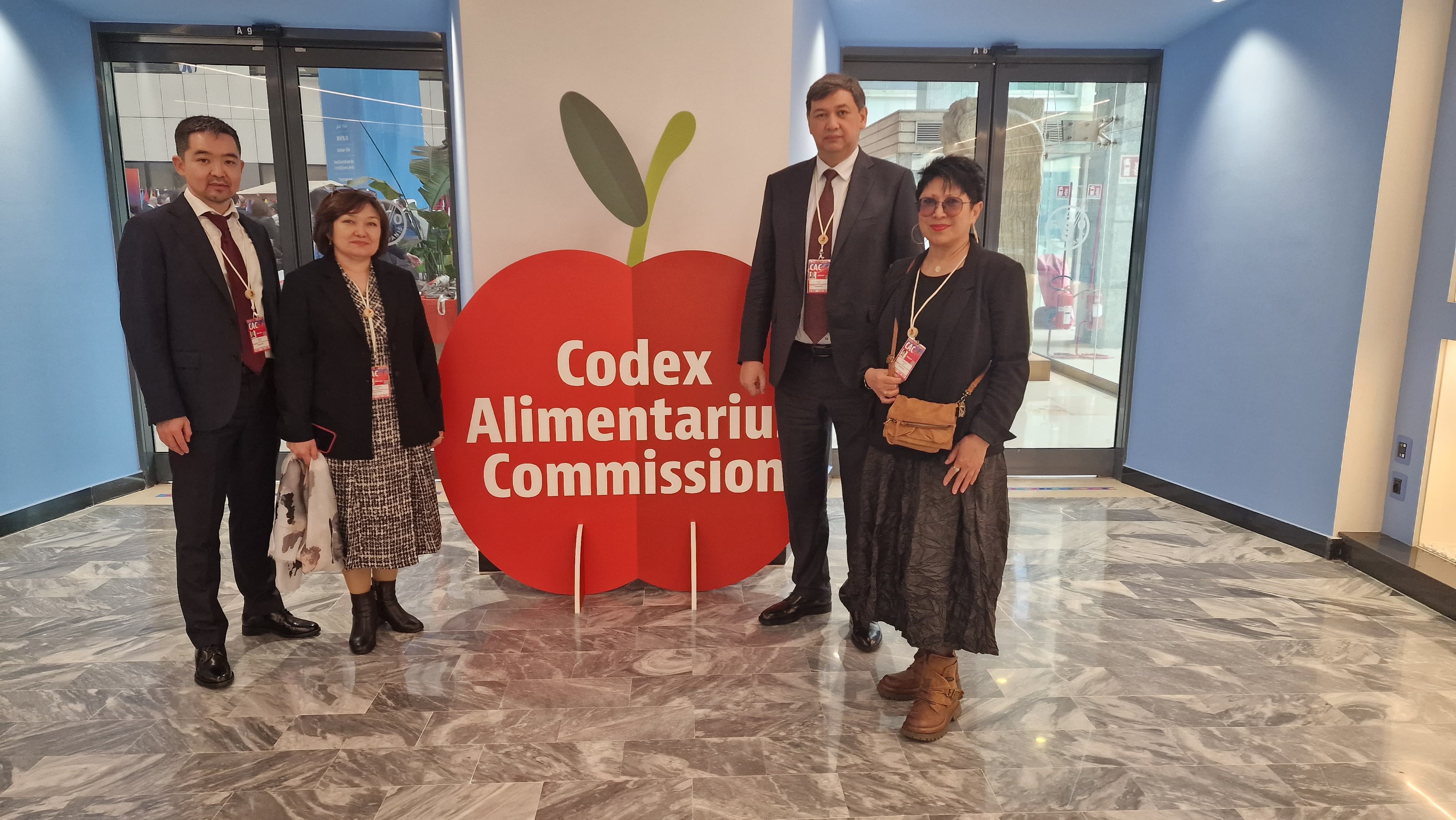
Today in Rome (Italy) the 46th session of the Codex Alimentarius Commission (hereinafter referred to as the 46th session of the Commission) began its work, which is attended by about 600 delegates from 189 countries.
The Kazakh delegation consists of 4 people. These are the Chairman of the Board of the National Centre of Expertise of the CSEC Ministry of Health of the Republic of Kazakhstan Erlan Kiyasov, National Coordinator for Codex Alimentarius, the head of the international cooperation sector of the National Center of Expertise of the CSEC Ministry of Health of the Republic of Kazakhstan Nailya Karsybekova, INFOSAN/RASSF contact point, the specialist in the international cooperation sector of the National Center of Expertise CSEC Ministry of Health of the Republic of Kazakhstan Zeinulla Sharipov and the Leading specialist of the Kazakh Academy of Nutrition Aigul Sharipbaeva.
The first day of the session, November 27, 2023, was dedicated to the celebration of the 60th anniversary of the Codex Alimentarius Commission with speeches from the heads of FAO, WHO, chairman of regional and specialized committees. The 46th session of the Commission will run until December 2, 2023.
Delegates will have to discuss important issues within the framework of relevant committees, such as residues of veterinary drugs in foods, nutrition and foods for special dietary uses, food additives, etc. On December 1 this year, the Kazakh delegation will participate in the discussion of antimicrobial resistance and implementation of activities under the Trust Fund Project.
A heated debate is expected on the draft MRL for zilpaterol hydrochloride. This issue is of particular importance for the European Region, as are others, in particular the draft Strategic Plan 2026-2030, new sources of food and food production systems.
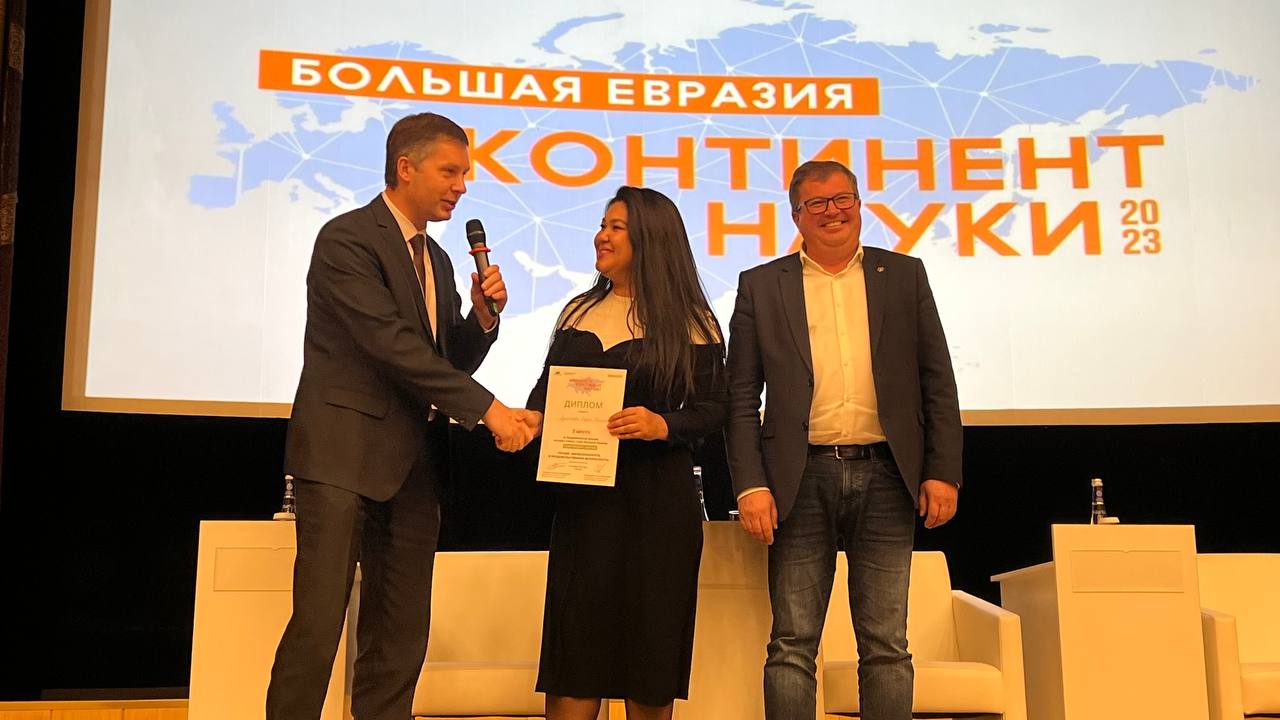
National expert Auteleeva L. participated in the Academic Forum of Young Scientists from Big Eurasia Countries “Continent of Science”.
Young scientists from 14 countries took part in the forum. This forum was held as part of the celebration of the 300th anniversary of the Russian Academy of Sciences of the Russian Federation.
The report “Aflatoxin contamination of various nuts and the development of methods for their detoxification” took second place.
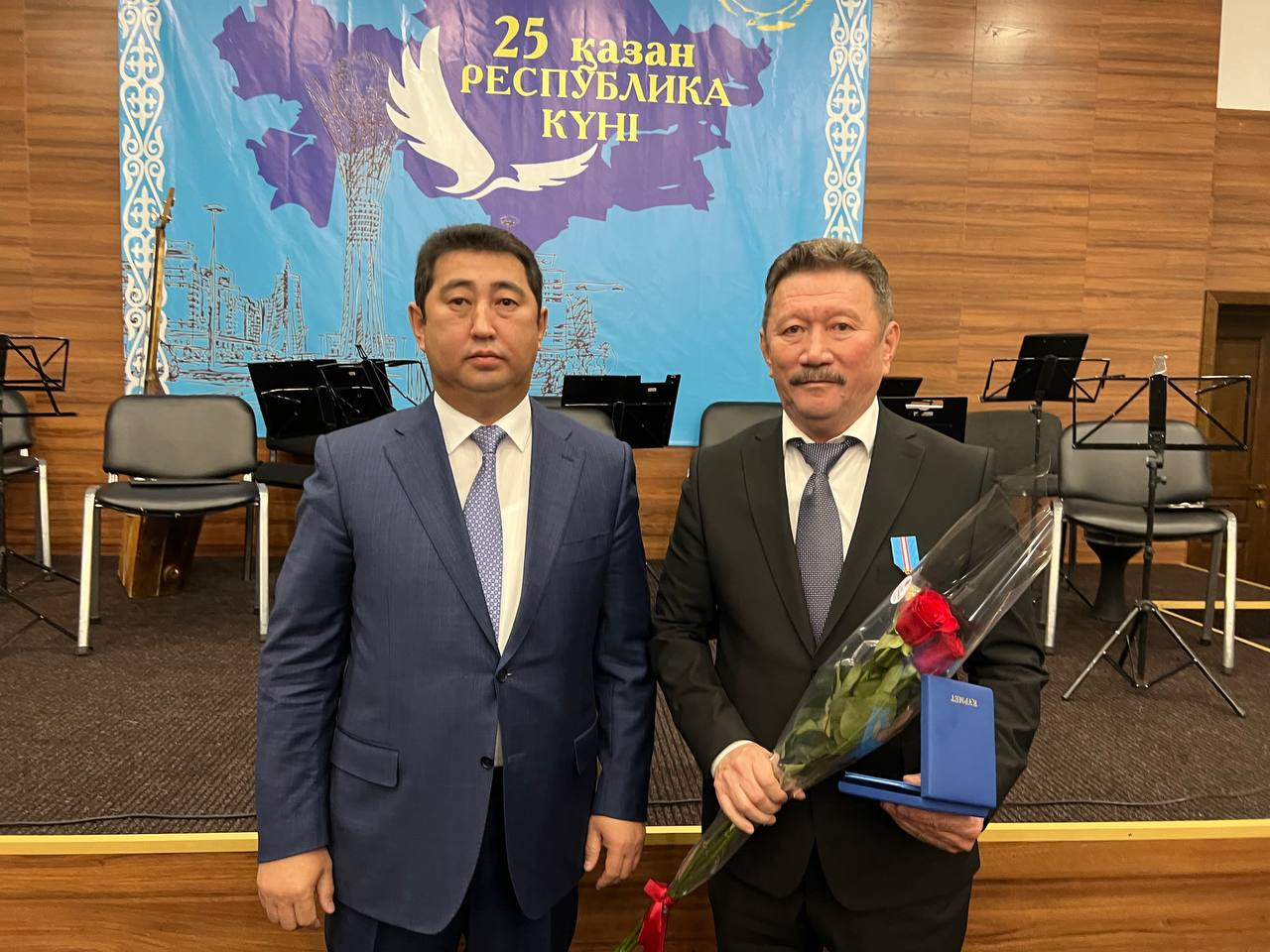
Congratulations to the member of the Interagency Steering Council on Codex Alimentarius, national expert on food safety, professor of the Kazakh Agrotechnical Research University. S.Seifullin Maikanov Balgabay Sadepovich with the awarding of the Kurmet Medal!
Under the guidance of prof. Maykanov B.S. 9 Candidate of Sciences and 1 Doctor of Sciences dissertations and 3 PhD thesis were defended. Based on the results of scientific research, more than 300 scientific works have been published, including textbooks, teaching aids, monographs, etc. Prof. Maykanov B.S. is also the author of the discipline for undergraduates “Codex Alimentarius in the expertise of foods”, thus being an innovator in the implementation of Codex standards in the educational system.
Merits of Prof. Maykanov B.S. were recognized with the badge "Honored Worker of Education of the Republic of Kazakhstan", the medal "For Merit in the Development of Science of the Republic of Kazakhstan". The professor is the owner of the state grant “Best University Teacher” and others.
We are confident that authority, knowledge, and concern for food safety issues in the country will lead to further achievements and victories, as well as subsequent awards, as evidence of recognition of the professor’s merits!
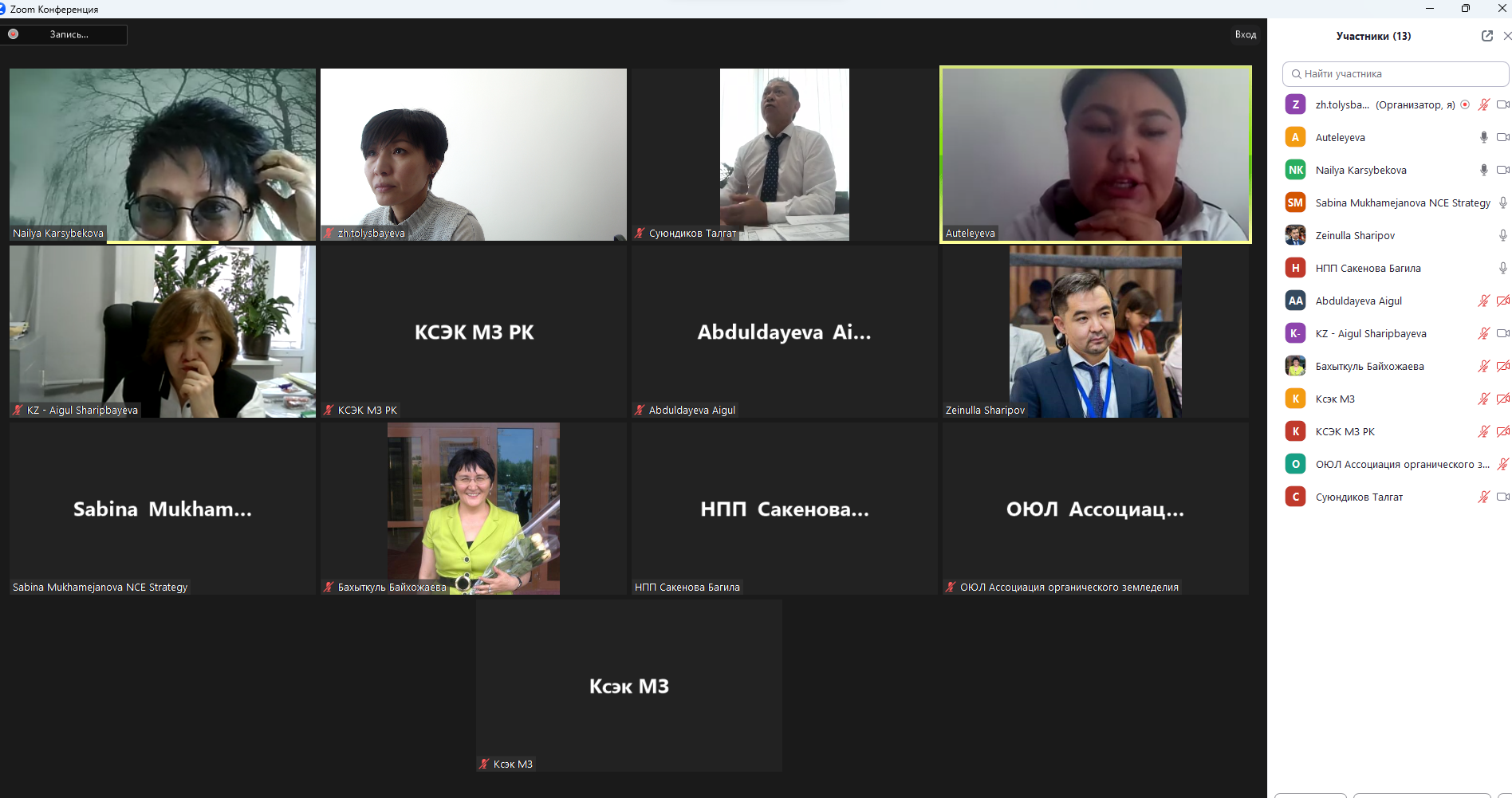
On October 13, 2024, zoom meeting of the Intersectoral Steering Coordinating Council on Codex Alimentarius issues was held. Doctor of Medical Sciences, Professor Karsybekova Nailya submitted a report on the activities of the Codex Alimentarius Group for the II-III quarters (April-September) 2023. Subject of the report was on the activities of the Codex Alimentarius Group with the Committee for Sanitary and Epidemiological Control of the Ministry of Health of the Republic of Kazakhstan, on Codex profile Committees, and within the framework of the NCE work, as well as information on meetings and events held on reporting period.
Secretary of the Council Tolysbaeva Zhanar reported on the implementation of the Protocol Order’s decisions to meeting of the Interdepartmental Council dated April 21, 2023.
Professor Karsybekova N.M. informed about the preparatory work for the implementation of the Trust Fund project event - holding the final conference “Codex Alimentarius. Results, lessons learned, successes.” The draft program for this conference was presented. Council members discussed the topics of the reports. The draft was approved. Work related to arranging final conference will be continued.
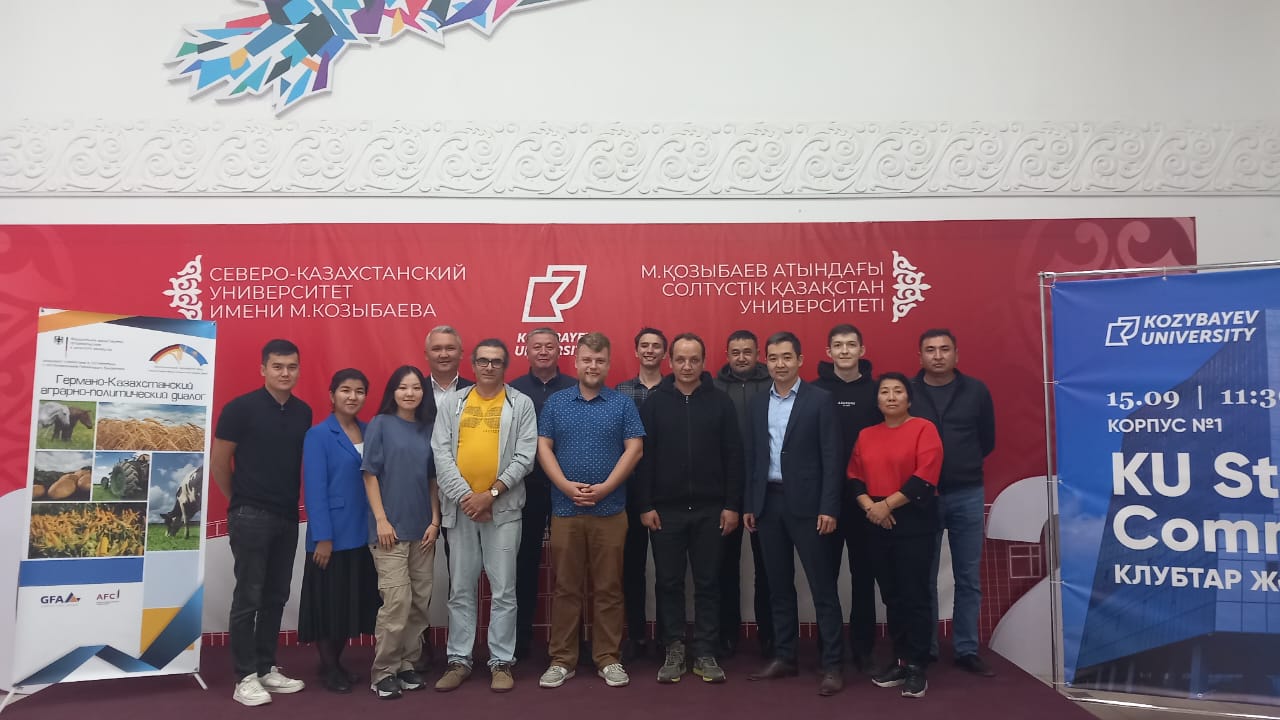
The project “German-Kazakh Agrarian-Political Dialogue” conducted training for local partners and beneficiaries, teachers of agricultural universities, research institutes, consultants and specialists in organic farming with the involvement of experts from the International Federation of Ecological Agricultural Movement (IFOAM). The training took place from September 18 to 22, 2023 on the basis of the NJSC North Kazakhstan University named after. M. Kozybaev" in Petropavlovsk.
One of the main issues discussed at this training was the regulation of organic production in the EU. The main aspects of the recently entered into force European Union Regulations No. 2017/625 and 2018/848 regulating the production of organic products, their labeling and control systems, as well as the international standard Codex Alimentarius GL 32–1999 “Guidelines for production, processing, labeling” were considered and marketing of organic food products."
A visit was made to the enterprise for processing and exporting organic grain, “Dikanshy Firm” LLP, as well as the farm of PE “Strelets”, which is engaged in growing potatoes and producing vermicompost using organic farming methods.
Guarantee systems for organic producers, including second-party certification, were also presented. An overview of organic markets and value chains was provided, as well as trends and approaches.
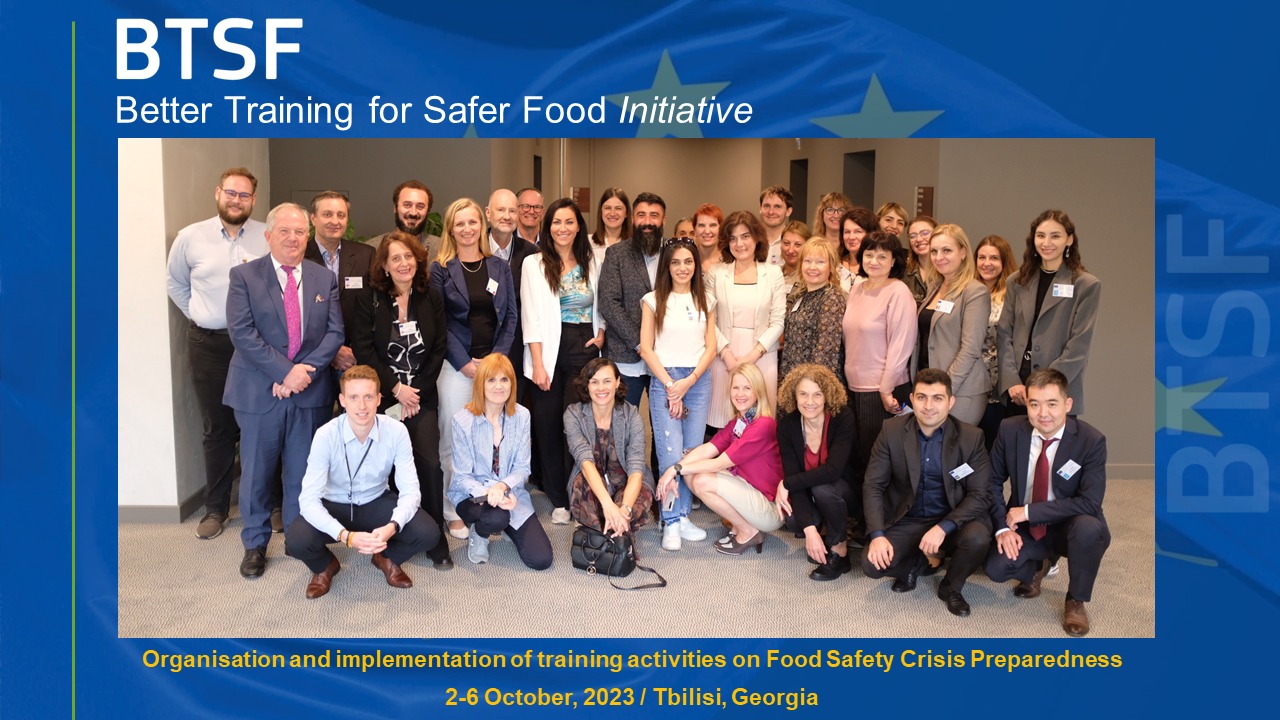
From October 2 to October 6, 2023, a BTSF seminar on «Food Safety Crisis Preparedness» was held in Tbilisi, Georgia. The event was held as part of the 10th session of the EU-funded Better Training for Safer Food (BTSF) programme. The seminar was attended by representatives of Kazakhstan, Azerbaijan, Moldova, Ukraine, Latvia, Lithuania, Poland, the Czech Republic and other EU countries.
The main goal of the program is to provide specialized and advanced training as part of INFOSAN's global collaboration on food safety crisis preparedness and management.
The structure and tools of the WHO information system - the International Food Safety Authorities Network (INFOSAN) were presented at the seminar. The EU framework and tools for food safety crisis preparedness and management were reviewed. The main aspects of emergency plans and operational procedures in crisis mode were presented.
The acquired knowledge was consolidated in practical classes in groups based on an analysis of a specific situation.
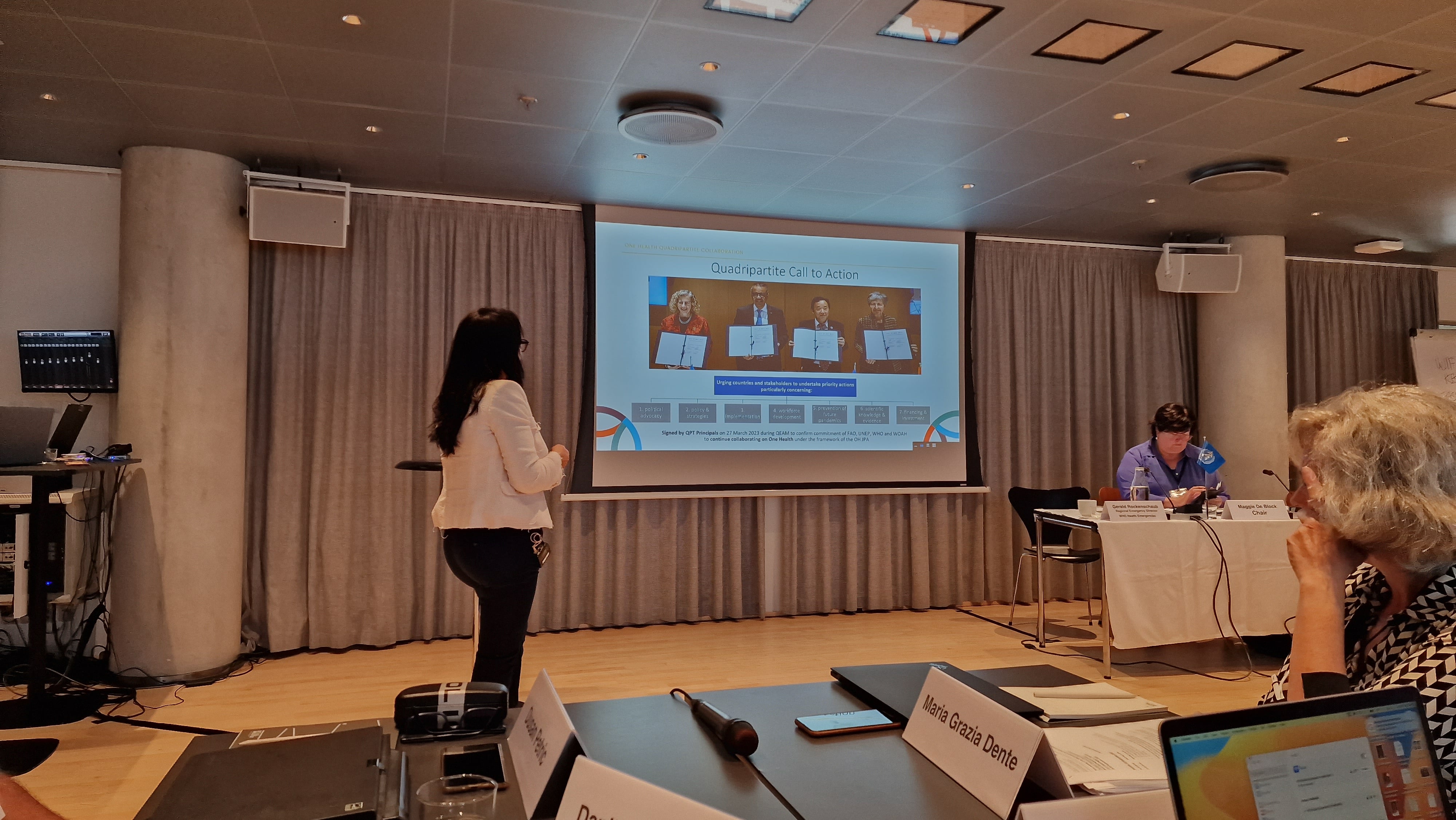
Member of the Technical Advisory Group (TAG) for One Health of the European WHO office, Doctor of Medical Sciences, Professor Nailya Karsybekova took part in the third meeting, which took place from September 18 to 20, 2023 in Copenhagen, Denmark.
The meeting was opened by the Director of the WHO European Office, Hans Kluge, who noted the enormous contribution of TAG to the work of the region within the framework of the One Health approach.
The work was attended by 25 members from different European countries, representatives of the OIE, and the United Nations Environment Program (UNEP).
Reports were presented from the headquarters of WHO, UNEP, and the EU. WHO country offices reported on the implementation of the One Health approach in Kazakhstan and Azerbaijan.
The chairmen of the TAG working subgroups reported on the results of the summer consultations with TAG members.
TAG members made comments and additions to the draft operational document for the implementation of the One Health approach in the European Region. The final version will be presented to TAG members to finalize the document. The final version of the document will be presented at a high-level meeting of European health ministers, which will be held on April 14-15, 2024 in Israel.
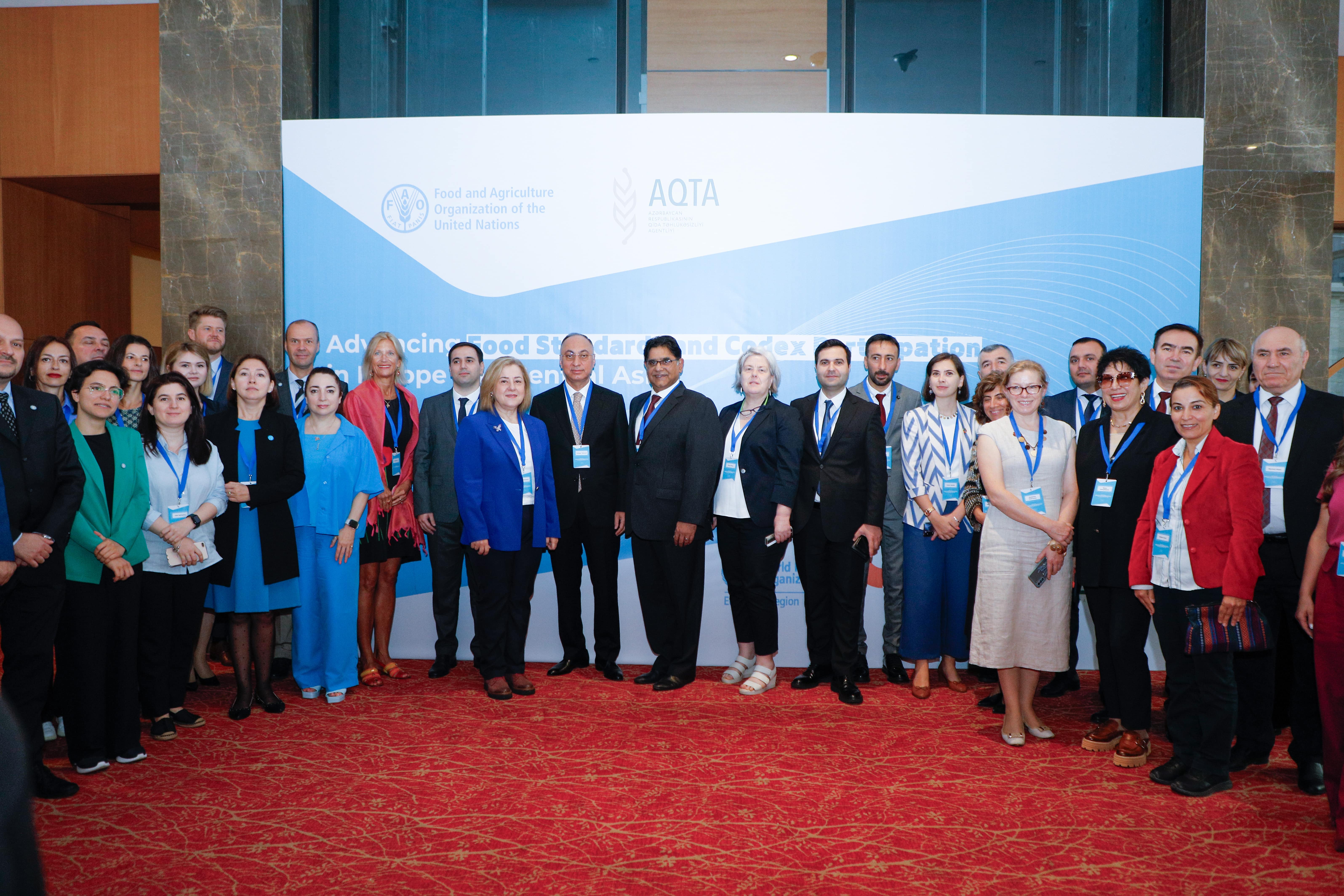
On September 14-15, 2023 Karsybekova N.M. took part in the regional forum “Further development of food safety standards and participation in the Codex of Europe and Central Asia” in Baku, Azerbaijan.
Forum was attended by representatives of the European countries, regional offices of FAO and WHO, as well as the Regional coordinator (Germany), WTO, IPPC, OIE, WB who are actively working in the region in food safety and the Codex, representatives of the Azerbaijan government, scientific and academic community and producer organizations participated in the event from Azerbaijan.
Progress, problems of use and participation in the Codex of the region were discussed, and current aspects of food safety were considered within the framework of the “One Health” concept.
FAO/WHO Trust Fund project grant recipient countries shared experiences, lessons learned and success stories.
The Azerbaijan Food Safety Agency (AFSA) celebrates its fifth anniversary this year. Employees presented their work experience over the past period, identified problems and ways to solve them.
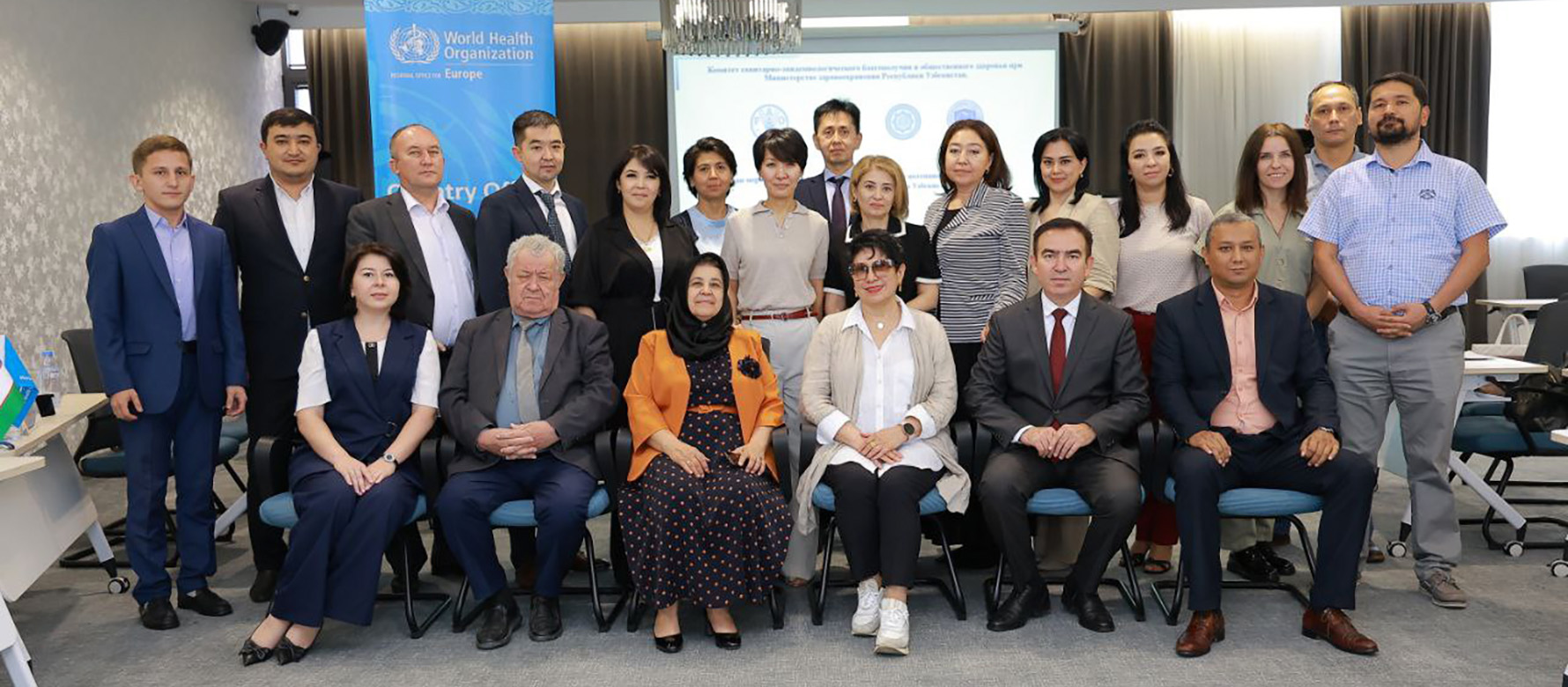
September, 7-8, 2023, The Codex Alimentarius Team took part in a workshop for national experts of Uzbekistan by the invitation of the Ministry of Health, Sanitary and Epidemiological Welfare and Public Health Committee.
The workshop was attended by representatives of the country offices of FAO, WHO, WTO lawyer-consultant, interested ministries and departments, researchers, and food producers.
Kazakh experts introduced the participants to the basics of the work of the Codex Alimentarius Commission and its subsidiary bodies – the committees. An analytical review of the test circular letters was conducted by the participants themselves. An analysis of errors was carried out and recommendations were formulated for their elimination, an appropriate assessment of the work of the experts’ groups was given.
The organizers and participants of the workshop expressed gratitude to the Codex Alimentarius Team of Kazakhstan for the assistance and advisory assistance provided.
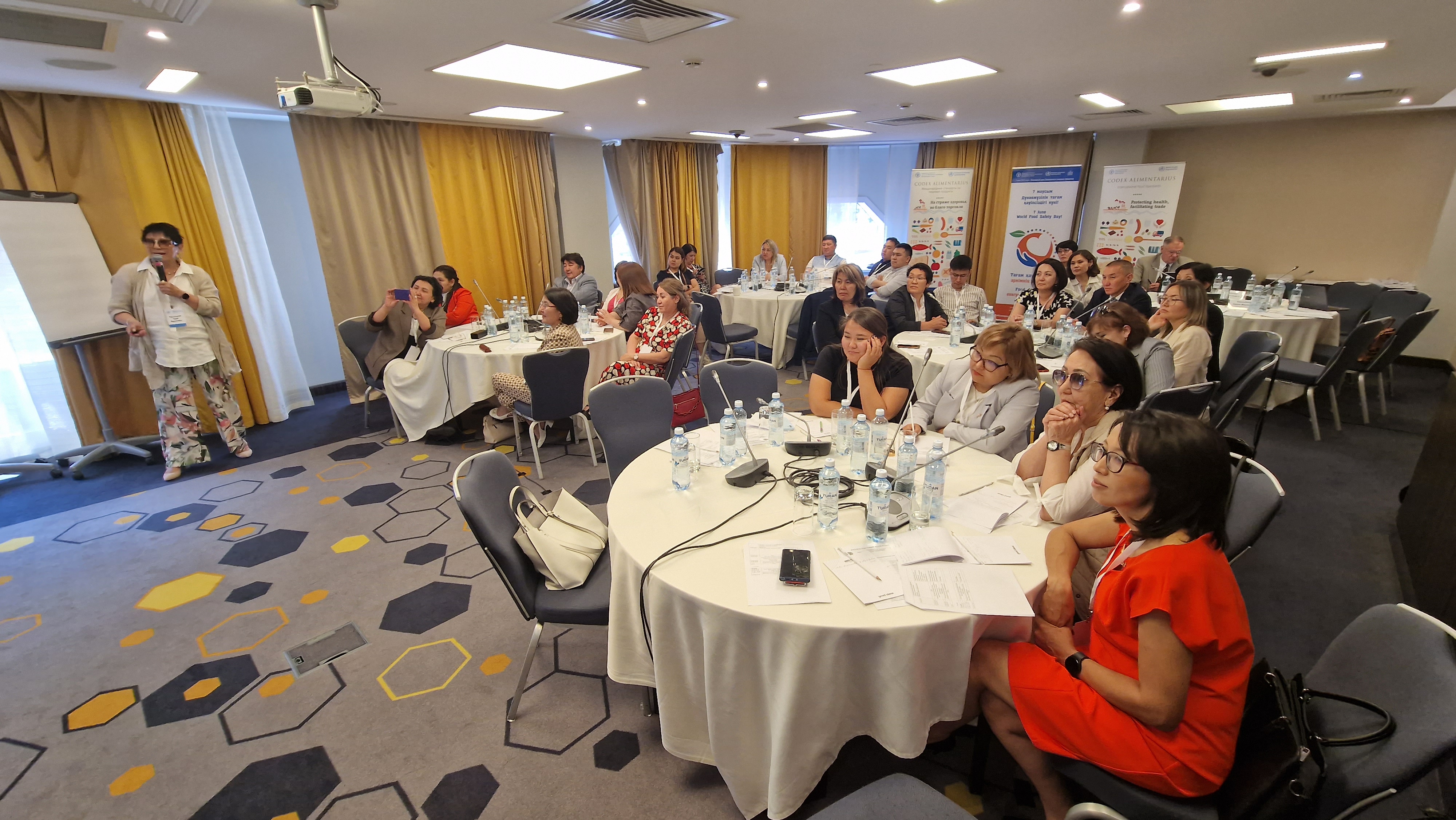
A two-day workshop for national food safety experts was held in frame of the WHO Trust Fund Project "Building sustainable national capacity on Codex Alimentarius" for 2021-2023 in a physical mode. The previous 2 workshop was held online.
The workshop was opened by Nailya Karsybekova, Professor, MD, National Coordinator for Codex Alimentarius. She also made a report on the experience of Kazakhstan in the framework of the Codex Alimentarius Commission.
Invited WHO international expert Jeronimas Maskeliunas informed about international rules governing food trade, as well as scientific support and the role of national experts in the development of documents in the Codex Alimentarius Commission.
Codex contact point Tolysbayeva Zh. spoke about the Codex documents and standards, the algorithm of the national expert actions in the formation of comments on the Codex Committee circular letters. Relevant examples were given from experience of the work at Codex Committee on Contaminants in Foods.
INFOSAN Coordinator Sharipov Z. made a presentation on issues from development to implementation of Codex Alimentarius standards using the example of the Codex Committees on Residues of Veterinary Drugs, Pesticide Residues in Food, Imports, Inspection and Certification Systems for Food Imports and Exports. Topical issues of work within the above committees were also presented.
Professor Karsybekova N. provided information on new food sources. The presentation aroused genuine interest among the audience and sparked discussions from both a professional and a consumer point of view.
The second day of the workshop began with an anonymous survey of the audience on the Codex Alimentarius issues and CAC work. Then the experts made comments from the groups on previously received circular letters. The comments were discussed by all experts, and the international expert Jeronimas Maskeliunas made a conclusion.
The workshop participants were awarded certificates.
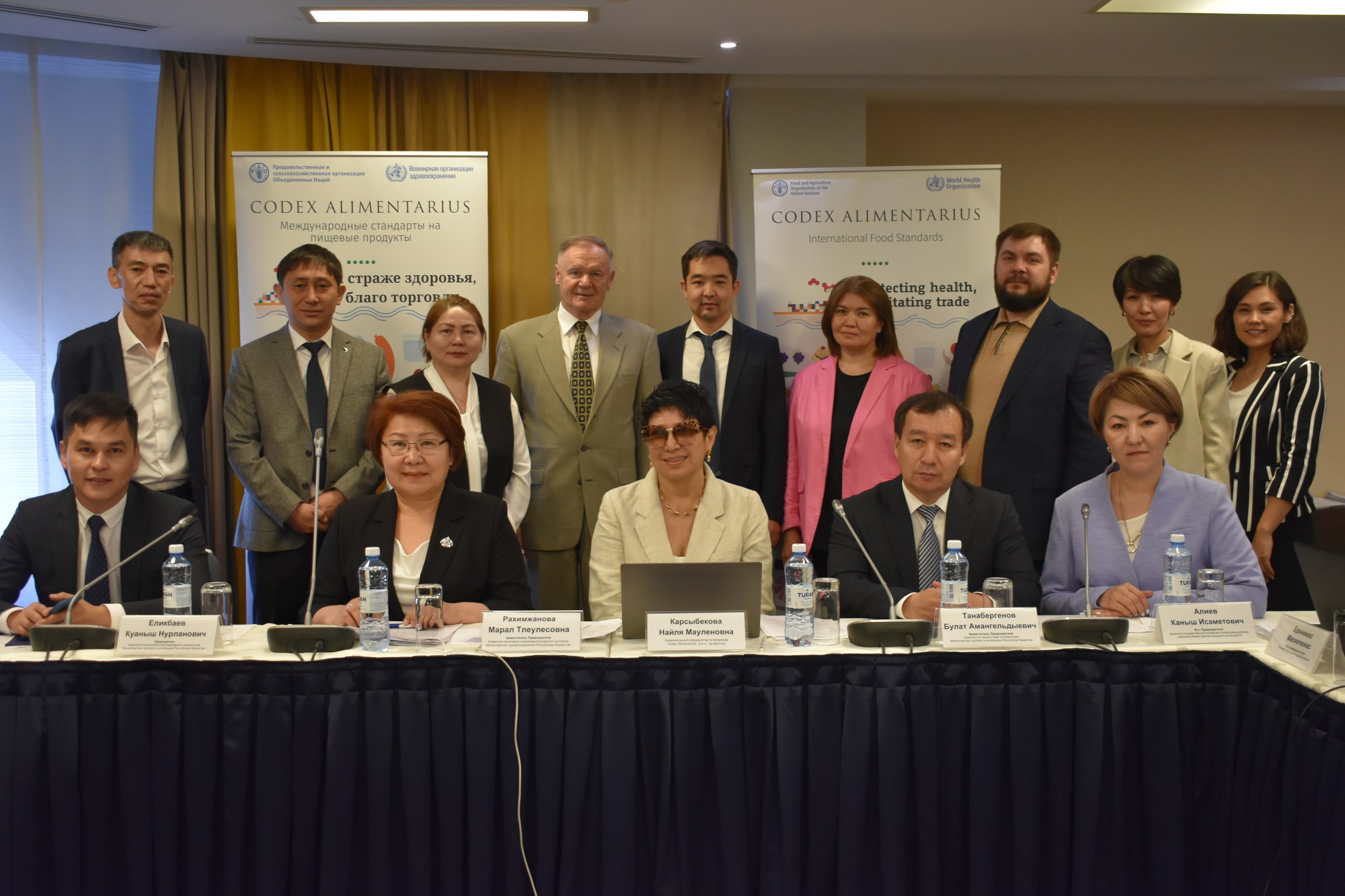
Within the framework of the FAO/WHO Codex Trust Fund Project of the Republic of Kazakhstan a round table «The role of Codex Alimentarius standards in international trade» was held on June 14, 2023. This round table was dedicated to the discussion of the application of Codex Alimentarius standards in the Republic of Kazakhstan and topical issues of food safety both in export-import and in its implementation on the domestic market. The moderator of the event was the Deputy Chairman of the Sanitary and Epidemiological Control Committee of the Ministry of Healthcare of the Republic of Kazakhstan Rakhimzhanova M.T.
The participants of the round table were Chairman of the Committee for Technical Regulation and Metrology of the Ministry of Trade and Integration of the Republic of Kazakhstan K.N. Elikbayev, Deputy Chairman of the Committee for Consumer Protection of the Ministry of Trade and Integration of the Republic of Kazakhstan B.A. Tanabergenov, Head of the Veterinary Control and Supervision Committee of the Ministry of Agriculture of the Republic of Kazakhstan S.A. Abylkasymova. Also, there were representatives of the management of the RSE on REM «Republican Veterinary Laboratory» VCSC MoA RK, the RSE on REM «KazStandart» TRMC MoT RK, as well as representatives of the National Chamber of Entrepreneurs of the Republic of Kazakhstan «Atameken» also took part.
In her speech, Deputy Chairman of the Sanitary and Epidemiological Control Committee of the Ministry of Healthcare of the Republic of Kazakhstan Rakhimzhanova M.T. noted «The rapid development of production technologies and the Internet bring international trade in food products to a new level. This requires the governments of the countries to strengthen their work and coordination in ensuring food safety."
Chairman of the Committee of Technical Regulation and Metrology of the Ministry of Trade and Integration of the Republic of Kazakhstan K.N. Elikbayev told in his speech about the ongoing work in the field of technical regulation on the safety and quality of food products. The work carried out within the framework of the development and application of technical regulations and standards in force on the territory of the republic was presented. At the same time, he is noted that the basis for their development are international standards, including the Codex Alimentarius.
Also, the report on ensuring food safety in the veterinary medicine made by the Head of Directorate of the Committee on Veterinary Control and Supervision of the Ministry of Agriculture of the Republic of Kazakhstan Abylkasymova S.A., with emphasis on the measures taken to develop and improve the veterinary control system.
Following the results of the Round Table, important issues of food safety were discussed and the following recommendations were adopted:
1. The need to strengthen intersectoral cooperation in the monitoring, control and supervision of food safety, including by improving the legislation of the Republic of Kazakhstan.
2. In the light of possible global and regional challenges and threats, improve the communication mechanism and update the list of responsible persons to ensure interaction with the international community (INFOSAN, IHR, TBT/SPS Information Center, etc.).
3. Update the lists of responsible persons of departments and subordinate organizations, including scientists, to ensure regular participation in the work on Codex Alimentarius documents and standards.
To keep up-to-date the register of national experts for working with Codex Alimentarius documents and standards.
Conduct training of national experts in a systematic manner.
4. To recommend to the authorized bodies to promote export-oriented products to work out in advance the issues of readiness to ensure proper control over the implementation of safety and quality of products.
5. Declare the need to implement a mechanism to confirm the implementation of food safety on the basis of HACCP principles.
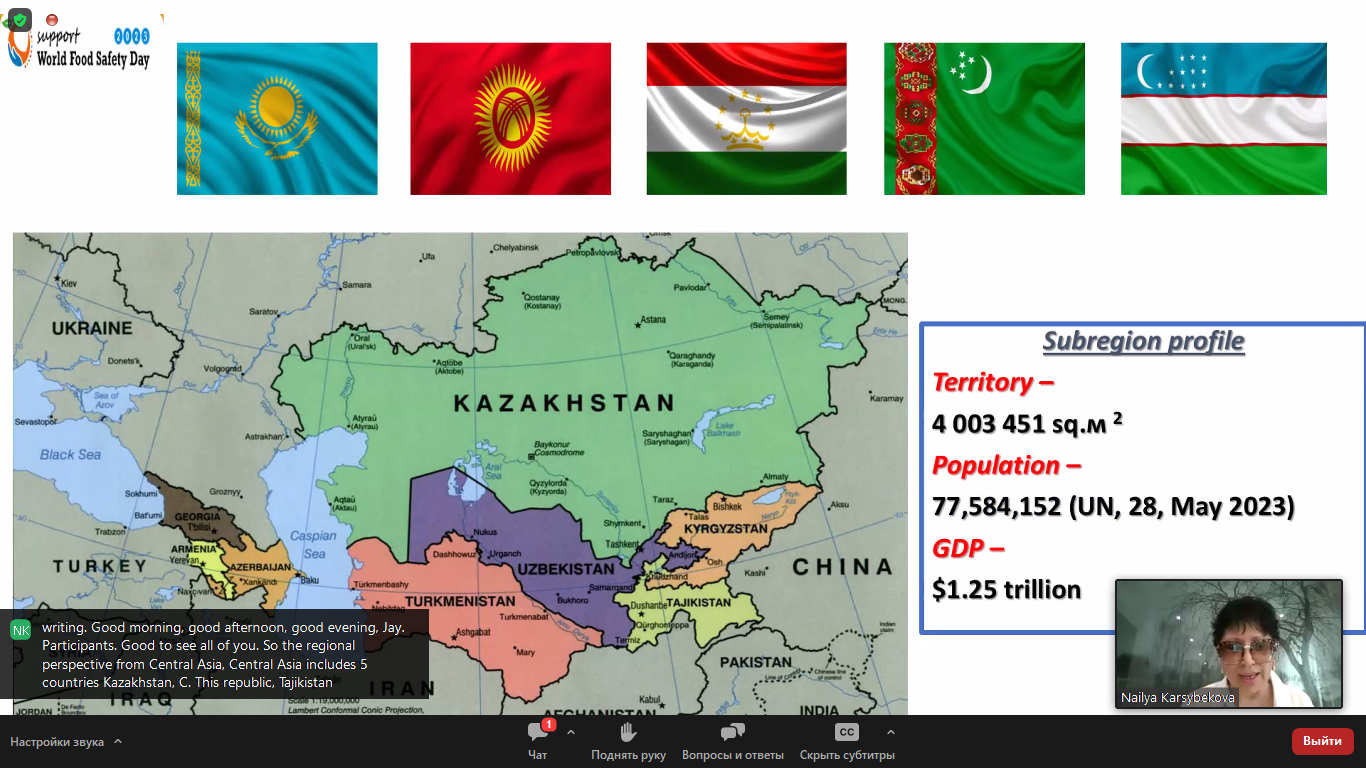
About 200 INFOSAN coordinators of the world took part in the webinar.
Presentations discussed the role of Codex standards, INFOSAN in international food trade and in the prevention of emergencies born contaminated food.
FAO Representative Eleonora Dupоuy reported on improving the resilience of agri-food systems through Codex and INFOSAN standards.enhancing the sustainability of agri-food systems through Codex standards and INFOSAN. For example, Diego Varela, Deputy Chairman of the Codex Alimentarius Commission, presented the draft Codex Alimentarius Guidelines on Food Safety in Emergencies.
WTO Representative Christine Wolf reviewed available information on food safety and trade. Dr Marion Gottschald, Federal Institute for Risk Assessment, Germany spoke about the Food Chain Laboratory.
Dr. Karsybekova Nailya reported on the regional perspectives of Central Asia in terms of the Codex and Infosan. National Perspectives on Qatar presented by Dr. Wasan Al Baker, Qatar.
Moderator, Dr Moez Sanaa, WHO noted that the webinar was productive and useful for the audience.

June 14, 2023. A round table dedicated to the World Food Safety Day (WFSD) was held. The Round table was opened by the Chairman of the CSEC of the MoH RK Sadvakasov N.O., the head of the WHO Country Office Dr. Skender Syla, Bozaeva Janyl from the country office of the FAO Regional Office for Europe, and the head of the Subregional Coordinating Office of the World Organisation for Animal Health, Mereke Taitubaev.
Sadvakasov N.O. noted: "It's no secret that the foods we consume determine the standard of our lives and the well-being of future generations." The FAO representative believes that "Unsafe food is not food!".
WHO estimates that eating food contaminated with bacteria, viruses or parasites, or poisoned by toxic or chemical substances, causes 600 million foodborne illnesses and 420,000 deaths each year.
The Round Table raised and discussed issues of a new approach to inspections of subjects, including food consumption places, ensuring public health in food safety during emergencies, the role of the veterinary service in food safety system, technical regulation to ensure food safety and aspects of the development of laboratory services.
Jeronimas Maskeliunas, an invited WHO international expert, emphasized the importance of the documents developed by the Codex Alimentarius Commission for the prevention of food poisoning. The resolution was adopted at the end of the event.
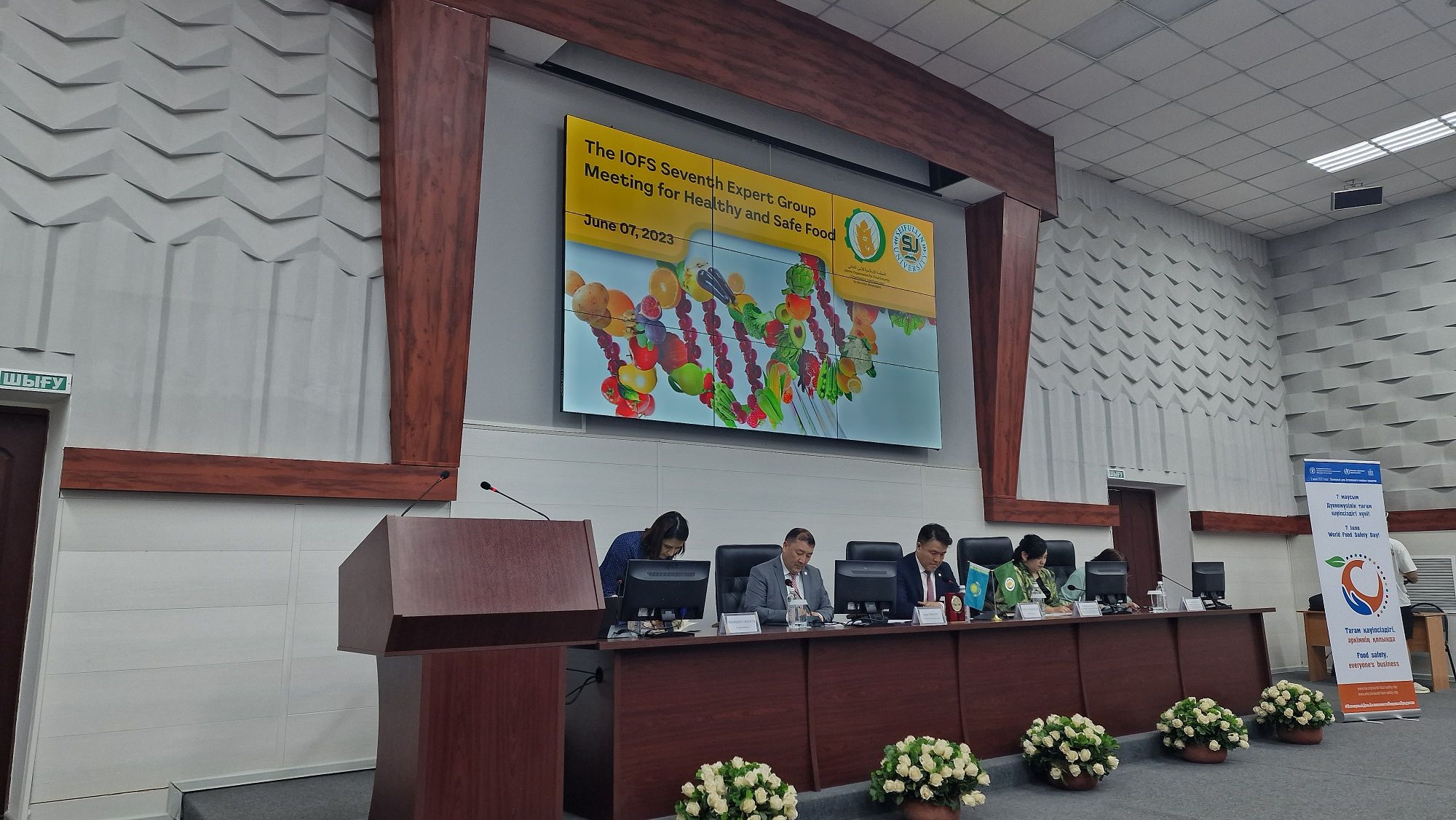
The Codex Alimentarius Group participated in the Islamic Organization for Food Security (IOFS) Seventh Expert Group Hybrid Meeting on Healthy and Safe Food. The meeting was arranged by the Islamic Organization for Food Security and the Kazakh Agro University named after S. Seifullin. The Rector of KazAtu, academician of the National Academy of Sciences of the Republic of Kazakhstan Tireuov KM, general director of IOFS E. Baidaulet, Ministry of Agriculture, professors of the universities of Iran and Pakistan made a welcoming speech.
In frame the plenary session, presentations were heard and discussed on the IOFS methodology for the inclusion of non-Tayyab food products, the traceability system, advanced blockchain capabilities for traceability from “gene to fork”, the role of food safety in education and science, the potential and barriers in the export of Kazakhstani food products, food hygiene in Jordan, dehydration issues and technologies in Pakistan, strengthening the food safety of poultry meat through the training of teachers and students of the University of Arkansas, USA. The experience of such training programs will be introduced in KazAtu named after S. Seifullin.
Dr., Professor Karsybekova Nailya made a presentation on the Codex Alimentarius Commission. Experience of Kazakhstan.
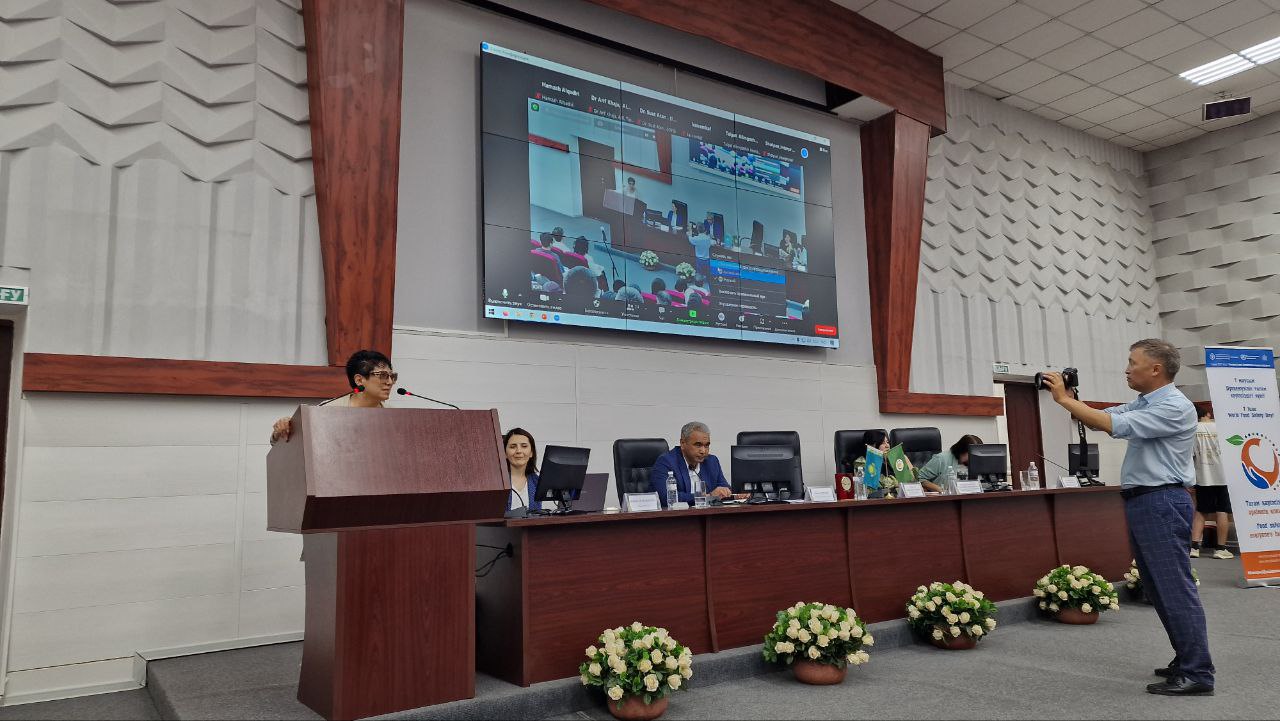
THEME 2023 - "Food standards save lives"
Food supply chains involve several people: producers, processors, transporters, distributors, retailers, cooks as well as consumers.
At every point in the chain, there are hazards that can cause contamination. Everyone involved at the various stages has a responsibility to keep food safe.
There are five calls to action on World Food Safety Day:
1. Ensure it’s safe - Governments must ensure safe and nutritious food for all
2. Grow it safe - Agriculture and food producers need to adopt good practices
3. Keep it safe - Business operators must make sure food is safe
4. Know what’s safe - Consumers need to learn about safe and healthy food
5. Team up for food safety – Let’s work together for safe food and good health!
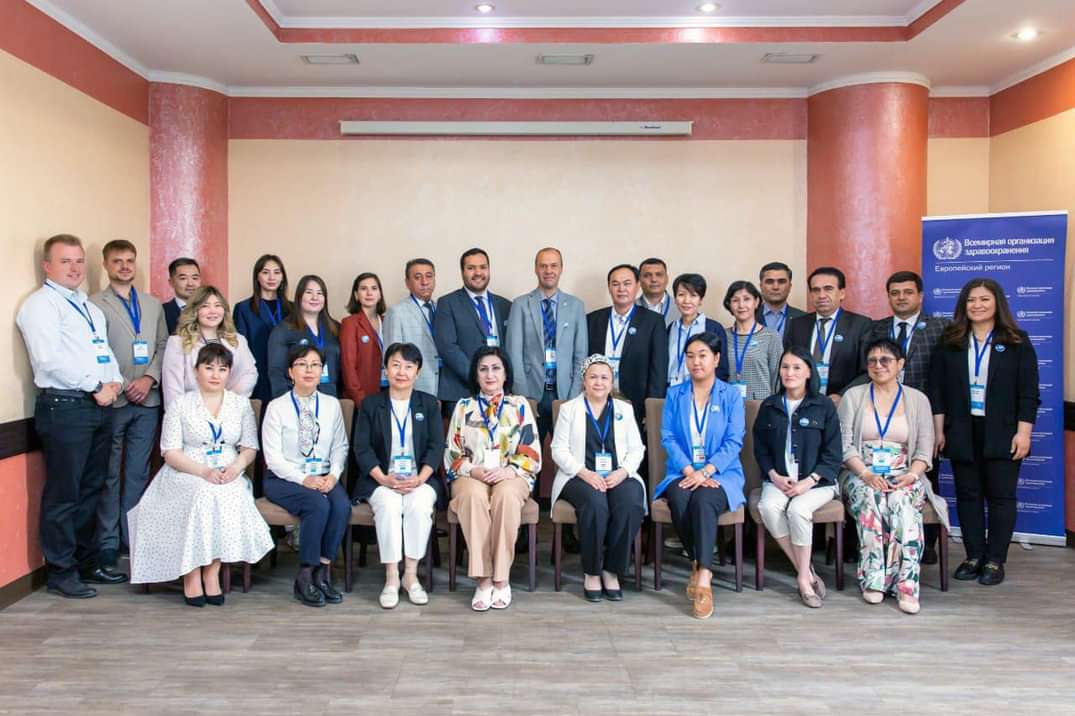
May, 24-25, 2023, the INFOSAN Secretariat, FAO and WHO European Offices held the Sub-regional Workshop on Rapid Information Exchange during Food Safety Emergencies in Central Asia in Almaty, Kazakhstan.
The delegations of Kazakhstan, the Kyrgyz Republic, Tajikistan, Turkmenistan and Uzbekistan were represented by specialists from the sanitary and epidemiological services of the countries. Codex Alimentarius Group, specialists of the Scientific and Practical Center for Sanitary and Epidemiological Expertise and Monitoring of the National Public Health Center of the Ministry of Health of the Republic of Kazakhstan, the Kazakh Research Institute of Plant Protection and Quarantine named after Zh. Zhyembayeva took part as observers.
The trainers of the workshop were experts from the Regional Offices of FAO and WHO, the INFOSAN Secretariat. Experts from the International Standards Agency of Great Britain and responsible person for INFOSAN in Turkey shared their experience.
Country delegations presented food safety emergency response systems at the national level. The delegations took part in simulation sessions, discussed the problems of interdepartmental implementation of emergency response and ways to solve them, and also got acquainted with the work of the INFOSAN Community website.
Thus, the workshop held with the participation of the Central Asia countries showed the initial status of emergency response systems in the field of food safety, problems and ways to solve them.
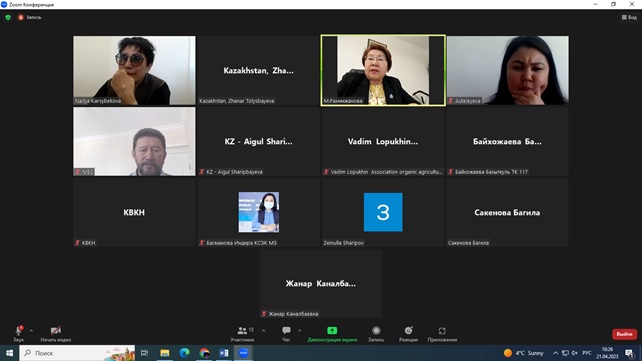
April 21, 2023, a meeting of the Interagency Coordinating Council (ICC) on the issues of the Codex Alimentarius was held. Members of the Council honored the memory of a member of the ICC, Professor Dalenov E.D. The Chairman welcomed the new member - Bukeeva Zh., Deputy Director of the Research Institute of Preventive Medicine named after Dalenov E.D. at the Astana Medical University.
Professor Karsybekova N. reported the activities of the Codex Alimentarius Team for the 1st quarter (January-March) 2023. The members of the Council were informed about the work with the CSEC of the Ministry of Health of the Republic of Kazakhstan, the Codex Committees, advisory assistance to neighboring countries, as well as meetings and events with partners and stakeholders, including AMR.
Further Dr. Karsybekova N. provided information on the proposal for the official register of national food safety experts. The document was discussed among the members of ICC. A round table was held on the rationing of trans fats and countermeasures against AMR within the framework of cooperation with the Coordinating Center for Technical Regulation of the KTRM MTI RK.
Chairman Rakhimzhanova M. proposed to discuss the priority Codex Committees for the RK. Their is the need for training in sampling on assessing the organoleptic properties of products. Professor KAZATU Maykanov B. informed the members of the Council about the availability of paid courses on this topic.
Prof. Karsybekova N. noted that the Codex Alimentarius Team currently works as the staff of the National Center of Expertise, Department of Strategic Development and International Cooperation.
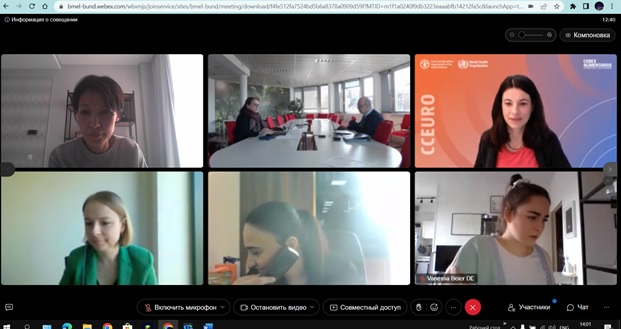
April 14, 2023, CCCF’16 pre-session meeting was held in online mode for delegates from the European region, chaired by Germany as the coordinating country. Azerbaijan, Great Britain, EU, Kazakhstan, Norway took part in the meeting.
The discussion took place on the following documents:
- Maximum levels for lead in certain food categories. Countries agreed to the proposed ML for lead in sugar. However, regarding to ready-to-eat meals for infants and young children, it was supported that children are more vulnerable consumer group, ingredients of these products should be selected to ensure the lead content is as low as reasonably achievable.
- Sampling plans for total aflatoxins in certain cereals and cereal-based products including foods for infants and young children. The EU proposes a single criterion for the LOQ (limit of quantitation) among the four aflatoxins (B1, B2, G1 and G2), as they use the same method of analysis. Kazakhstan added that all possible measures should be taken during sampling and preparation for testing to prevent any changes in the aggreged sample that could affect the content of analyzed mycotoxins in the sample.
- Maximum level for total aflatoxins in ready-to-eat peanuts and associated sampling plan. In the countries of the European region, nuts are not produced on an industrial scale. The occurrence data of aflatoxin total in ready-to-eat peanuts should be provided with analytical results from the different important peanut producing countries in the world.
- The prevention or reduction of ciguatera poisoning. It is necessary to create and develop a discussion paper within the framework of establishing an Electronic Working Group (EWG). It was announced that the EWG will be led by the European Union, Sweden and Spain.
- Forward work-plan for CCCF: Review of staple food-contaminant combinations for future work of CCCF. It’s decided to support Option 1 for follow-up, i.e. continuation of this work through the EWG.
April 4, 2023, the Round Table “National and international regulation of trans fat acids (TFAs) and residual veterinary drugs in food products” was held in a hybrid mood. On behalf of the Chairman of the Committee for Sanitary and Epidemiological Control (CSEC) of the Ministry of Health of the Republic of Kazakhstan, the participants were welcomed by the representative of the Committee. Interested enterprises, territorial departments of the CSEC MoH of RK, the Ministry of Agriculture of RK and others took part. The topic of the event aroused keen interest and, unfortunately, due to the limitation in connection of 100 people, not everyone could join.
The issue of TFAs regulating in oil and fat products began with the report of the Deputy Head of the Coordination Center for Technical Regulation of the RSE “Institute for Standardization and Metrology” Razzarenov A. The speech covered the standardization and TFAs regulation in the Republic of Kazakhstan and the EAEU. Codex contact point of RK Tolysbayeva Zh. provided information on the medical aspects of TFAs consumption, as well as work on TFAs within the Codex subsidiary bodies. Nevzorov K. continued the topic with a presentation “Natural and industrial trans-fatty acids”.
The second part of the Round Table was devoted to the problems of rationing the residual amounts of veterinary drugs in livestock products. A National Coordinator for Codex Alimentarius, Professor Karsybekova N. spoke about the meaning of a “silent pandemic” of antibiotic resistance, highlighted the consequences of the thoughtless use of antibiotics in medicine, veterinary medicine and the food industry.
Further Razzarenov A. informed the participants of the Round Table about the current situation regarding the rationing of residual quantities of veterinary drugs in products of animal origin. In turn, the Contact Point of the RK for INFOSAN and RASFF Sharipov Z. elaborated on the work of the Codex Alimentarius Commission on food-borne AMR.